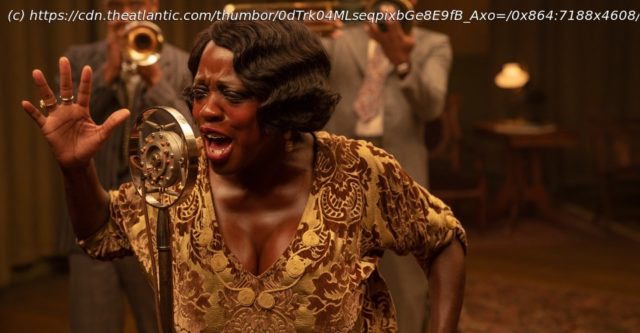Netflix’s new adaptation of August Wilson’s play understands the singular magic of the blues.
Ma Rainey’s Black Bottom begins with what seems at first like a harrowing journey. Netflix’s new adaptation of the late August Wilson’s play opens with a foreboding shot of the woods; the only noises are of crickets chirping, dogs barking, and young Black men gasping for air as they sprint through the trees. But then, we hear the music. As soon as the men detect Ma Rainey’s thunderous voice spilling out from a tent where the famed blueswoman is singing, we know they’re safe. Cradled by sweet sounds and the chatter of the crowd, they’ve made it home. Released yesterday on streaming, Ma Rainey’s Black Bottom tells the story of a fictionalized Ma (played by Viola Davis) gathering with her backing band to record new songs in a Chicago studio in 1927. The members of the band—Cutler (Colman Domingo), Slow Drag (Michael Potts), Levee (Chadwick Boseman, in his final role), and Toledo (Glynn Turman)—clash with one another and with the white managers producing Ma’s album. But like Wilson’s play, the George C. Wolfe–directed film isn’t just about a brilliant singer, or about the entertainment industry. The story concerns itself chiefly with the role of music in documenting and, in some cases, defusing the unspeakable pains that birthed the blues. Even when no songs are playing, Ma Rainey is a reminder of Wilson’s reverence for the genre. Just as the film takes care to depict its lead’s formidable presence, it pays attention to the larger forces threatening Ma’s artistry—and the lives of all the singers in the room with her. Though some of the disagreements among the band members stem from prosaic matters, much of the conflict in the studio is rooted in the racism of the era. Even when the musicians criticize one another’s style, musically or otherwise, they are really wrestling with their place in the country as Black men. When Toledo mocks Levee’s ostentatious sartorial choices, he scoffs that “more niggas have got killed trying to have a good time than God got ways to count.” Meanwhile, the white record-label managers treat Ma carelessly, seeing her only as a vehicle for their own profit. They botch her recordings, ignore her requests, and interrupt the band’s studio time. Ma knows that the executives, Irvin (Jeremy Shamos) and Sturdyvant (Jonny Coyne), don’t actually value her as a person. “They wanna take your voice and trap it in all them fancy boxes with all them buttons and dials, and then too cheap to buy you a Coca-Cola,” Ma tells Cutler at one point. “They don’t care nothin’ about me. All they want is my voice.” Along with showcasing her vocal prowess, Wilson’s play imbues the Georgia-born singer with the rebellious spirit that many observed in real life. As the blues scholar Steven C. Tracy wrote in his 1987 essay “A Reconsideration: Hearing Ma Rainey,” “Ma’s southern-drenched voice, echoing the field hollers and folk songs of 16-hour days among turn rows worked so unrelentingly that the laborers could see them in their dreams, had a depth of feeling matched by few other blues singers of her time.






